
EUROPEAN JOURNAL OF MIGRATION AND LAW
Scope & Guideline
Connecting research and practice in migration law.
Introduction
Aims and Scopes
- Legal Frameworks and Migration Policies:
The journal explores the legal frameworks governing migration and asylum in Europe, analyzing directives, regulations, and case law that shape the rights and obligations of migrants and states. - Human Rights and Vulnerability:
A significant focus is placed on the human rights implications of migration policies, particularly regarding vulnerable populations such as asylum seekers, unaccompanied minors, and irregular migrants. - Intersectionality in Migration Studies:
The journal examines migration through an intersectional lens, addressing how various identities (e.g., race, gender, sexual orientation) influence the migration experience and legal protections. - EU Externalization and Global Migration Governance:
The journal critically assesses the EU's externalization strategies in migration governance, including partnerships with third countries and their implications for human rights and protection. - Judicial Interpretation and Legal Challenges:
It analyzes judicial decisions and legal challenges related to migration, providing insights into the evolving interpretation of migration laws by European courts.
Trending and Emerging
- Asylum and Containment Policies:
There is an increasing focus on asylum containment strategies, particularly in relation to the EU's external border policies and their implications for human rights, indicating a growing concern over the effectiveness and morality of these approaches. - Intersectionality and Vulnerability:
Research on intersectionality has surged, emphasizing how overlapping identities affect migrants' experiences and access to rights, which is crucial for developing more inclusive policies. - Impact of Climate Change on Migration:
Emerging discussions around climate-related human mobility are gaining prominence, reflecting a recognition of environmental factors as significant drivers of migration and the need for legal frameworks to address these challenges. - Digitalization and Migration Control:
The intersection of digital technology and migration control, including the use of AI and data analytics in border management, is becoming a critical area of study, raising questions about privacy, surveillance, and human rights. - Legal Pathways for Refugees:
There is an increasing emphasis on exploring and establishing legal pathways for refugees, reflecting a shift towards finding sustainable solutions beyond traditional asylum processes.
Declining or Waning
- Focus on Economic Migration:
There has been a noticeable decline in papers specifically addressing economic migration policies, indicating a shift towards more pressing humanitarian and rights-based discussions in migration law. - Traditional Refugee Protection Models:
Discussions surrounding traditional models of refugee protection appear to be waning, as newer frameworks and concepts such as complementary pathways gain traction, reflecting a broader evolution in response to global migration challenges. - Crimmigration Studies:
Although still relevant, the focus on 'crimmigration'—the intersection of immigration and criminal law—has decreased, possibly due to a growing emphasis on human rights and the vulnerabilities faced by migrants.
Similar Journals
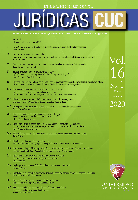
Juridicas CUC
Connecting Minds Through Legal ScholarshipJuridicas CUC, published by UNIV COSTA, is a distinguished open-access journal dedicated to the field of Law, prominent since 2011. With an ISSN of 1692-3030 and an E-ISSN of 2389-7716, this journal serves as a vital resource for researchers, professionals, and students in Colombia and beyond. It holds a commendable Q2 status in Law for 2023, and its Scopus ranking places it at #425 out of 1025 in Social Sciences _ Law, reflecting its commitment to high-quality scholarship, evident in its 58th percentile. The journal aims to foster academic dialogue by publishing innovative and impactful research, contributing to the advancement of legal studies in a global context. Located in Barranquilla, Colombia, Juridicas CUC is committed to enhancing accessibility to legal research, ensuring that scholars from various backgrounds can engage with contemporary legal issues effectively.

Revista Estudos Institucionais-Journal of Institutional Studies
Connecting scholars and practitioners for impactful research.Revista Estudos Institucionais - Journal of Institutional Studies is a distinguished open-access journal published by the Universidade Federal do Rio de Janeiro Law School, dedicated to advancing the field of institutional studies. Since its inception in 2015, the journal has committed itself to disseminating high-quality research that explores the complex dynamics of institutions, governance, and policy-making. The journal, known for its inclusive approach, welcomes submissions from a variety of disciplinary perspectives, fostering an interdisciplinary dialogue among researchers, policymakers, and practitioners. With an E-ISSN of 2447-5467, this journal aims to be a vital resource for academics and practitioners alike, promoting innovative ideas and critical analyses that contribute to the understanding of institutional frameworks in both Latin America and beyond. As an essential platform for scholarly discussion, Revista Estudos Institucionais is positioned to impact the future study of institutions by making rigorous research freely accessible to a global audience.

London Review of International Law
Engaging Minds on Contemporary Legal ChallengesThe London Review of International Law, published by Oxford University Press, is a prominent journal dedicated to advancing scholarship in the field of international law. With a focus on fostering critical discourse and interdisciplinary engagement, this periodical offers a platform for researchers, practitioners, and students to explore contemporary legal issues shaping global governance. Although the journal operates as a subscription-based resource, it does not currently provide open access options, thereby ensuring a curated selection of high-caliber, peer-reviewed articles intended to uphold rigorous academic standards. Since its inception in 2013, the London Review of International Law has been recognized within the Q3 category in Law for 2023, and it holds a respectable rank of #628 out of 1025 in the Scopus Law category. As the journal continues to innovate and reflect the dynamic nature of international legal discourse, it remains an essential resource for legal professionals and academics alike, enhancing their understanding and engagement with pressing global legal challenges.
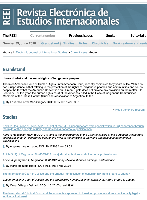
Revista Electronica de Estudios Internacionales
Navigating the Complexities of Global AffairsRevista Electronica de Estudios Internacionales is a prominent academic journal dedicated to the exploration of international studies, published by the esteemed ASOC ESPANOLA PROFESORES DERECHO INT & RELACIONES INT-AEPDIRI. Based in Spain, this journal has embraced an Open Access model since its inception in 2000, allowing researchers, students, and professionals to freely access and disseminate significant findings in the field. With an ISSN of 1697-5197, the journal highlights critical issues surrounding international law and relations, maintaining a vital role in the ongoing discourse within the academic community. Currently categorized as Q4 in the Law field and ranked #755 out of 1025 within the Scopus database, the journal offers a platform for innovative thinking and scholarly contributions, which are particularly important in today's rapidly evolving global scenario. Explore the latest research and insights from 2019 to 2023 in this essential resource for those engaged in the study and practice of international relations.

Public Law Review
Connecting Scholars and Practitioners in Public LawPublic Law Review is a distinguished scholarly journal published by LAWBOOK CO LTD, dedicated to the rigorous exploration and analysis of public law issues. As an essential resource for researchers, practitioners, and students alike, this journal provides a platform for the dissemination of critical legal scholarship, offering insights into contemporary public law developments, theory, and practice. With its commitment to maintaining high editorial standards, the Public Law Review plays a vital role in advancing knowledge and fostering debate within the legal community. Although not currently an open-access publication, it remains accessible through various academic repositories and libraries. The journal's ISSN 1034-3024 ensures its visibility within academic and professional circles, making it an indispensable reference for anyone interested in the evolving landscape of public law in Australia and beyond.
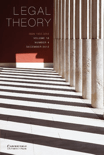
Legal Theory
Illuminating the Intersection of Law and PhilosophyLegal Theory, published by Cambridge University Press, stands as a significant academic journal dedicated to the exploration of the conceptual foundations and implications of law within the wider realm of philosophy. Established in 1995 and maintaining a consistent publication record through 2023, the journal has garnered a reputation for its high-quality scholarly contributions, reflected in its impressive rankings: Q2 in Law and Q1 in Philosophy as of 2023. With an impactful presence in the Scopus Ranks, Legal Theory is positioned 158th in Philosophy and 337th in Law, highlighting its relevance and influence—especially within the arts and humanities. This journal serves as a critical platform for researchers, professionals, and students who seek to engage with the intricate interplay between legal norms and philosophical inquiries. Though not open access, it offers a wealth of knowledge that is integral to advancing discourse in legal philosophy, making it an essential resource for those looking to deepen their understanding of contemporary legal theories and their implications.

Diritti Umani e Diritto Internazionale
Exploring the Intersection of Human Rights and International LawDiritti Umani e Diritto Internazionale is a distinguished journal that occupies a crucial role in the field of human rights and international law. Published by SOC ED IL MULINO, it serves as a reputable platform for scholars, practitioners, and students alike to explore and contribute to contemporary discussions surrounding human rights issues at a global scale. The journal aims to disseminate high-quality research and theoretical insights that address pressing legal challenges, thereby fostering a deeper understanding of human rights principles and their applications in various contexts. Though not currently an open-access publication, its rich content and rigorous peer-review process ensure that contributions meet the highest academic standards. With its ISSN 1971-7105 and E-ISSN 1972-5485, Diritti Umani e Diritto Internazionale stands as a vital resource for those committed to advancing knowledge in this essential area of study, ensuring that readers stay informed about the latest developments and debates in human rights law.
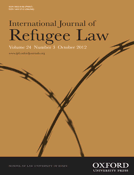
International Journal of Refugee Law
Exploring the intersection of law, policy, and human rights.International Journal of Refugee Law, published by Oxford University Press, is a leading peer-reviewed journal that has significantly contributed to the field of refugee studies since its inception in 1989. With an ISSN of 0953-8186 and an E-ISSN of 1464-3715, this journal provides a vital platform for interdisciplinary dialogue on issues related to migration, asylum, and the legal frameworks that govern refugee rights. It holds an impressive reputation within the academic community, as evidenced by its 2023 category quartiles—ranking Q2 in both Demography and Law, and Q3 in Management, Monitoring, Policy, and Law. Additionally, it boasts notable Scopus rankings, positioned in the 66th percentile among Law journals and the 50th percentile for Demography, indicating its relevance and impact. Researchers, professionals, and students engaged in these fields will find invaluable insights through its rigorous analyses, case studies, and policy discussions, albeit it operates under a traditional subscription model without open access. As the journal continues its mission through to 2024 and beyond, it remains instrumental in shaping discourse and understanding of contemporary refugee law, ensuring it is a must-read for anyone invested in the social sciences and legal studies.
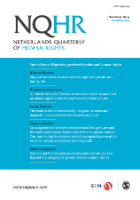
Netherlands Quarterly of Human Rights
Connecting Scholars and Practitioners in Human RightsNetherlands Quarterly of Human Rights is a prominent academic journal published by SAGE Publications Inc, focusing on a wide array of topics within the field of human rights. Established to advance scholarship in this critical area of study, the journal aims to provide an interdisciplinary platform for researchers, professionals, and students interested in human rights issues on both national and international levels. With a commitment to quality and rigor, it offers insightful articles, empirical studies, and critical commentaries that contribute to the understanding and promotion of human rights around the globe. Although it does not offer open access options, the journal is highly regarded in academic circles, fostering collaboration and dialogue among practitioners in the field. The journal's ISSN is 0924-0519 and its E-ISSN is 2214-7357, ensuring that its scholarly contributions are widely accessible through various research databases and platforms.

Nordic Journal of Migration Research
Exploring the Dynamics of Migration in the Nordic ContextThe Nordic Journal of Migration Research, published by HELSINKI UNIV PRESS, is a leading interdisciplinary open-access journal that has been contributing to the field of migration studies since its inception in 2011. With the ISSN 1799-649X, it provides a valuable platform for researchers, professionals, and students interested in exploring the complex dynamics of migration within the Nordic context and beyond. The journal holds a distinguished position in several categories, proudly achieving a Q2 ranking in fields such as Anthropology, Demography, Law, Sociology and Political Science, and Geography, Planning and Development as of 2023. These rankings highlight its significance and impact, particularly as it appeals to a diverse audience interested in the social, cultural, and legal aspects of migration. With its continuous publication through converged years from 2019 to 2024, the journal remains a crucial resource for advancing knowledge and fostering scholarly discourse in an era marked by global migration challenges. Located in Helsinki, Finland, the journal can be accessed freely, promoting wide dissemination of research findings that inform policy and practice.